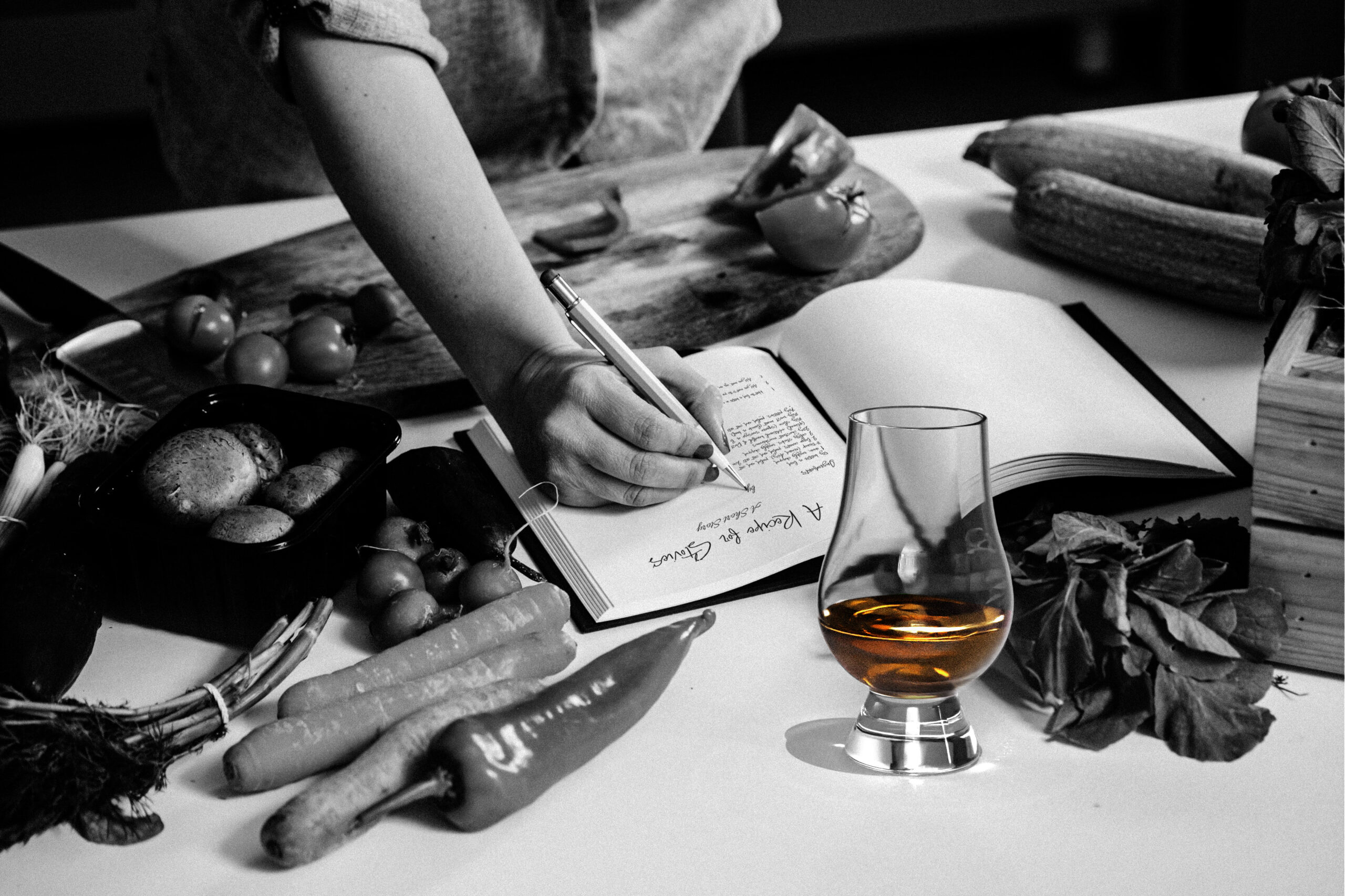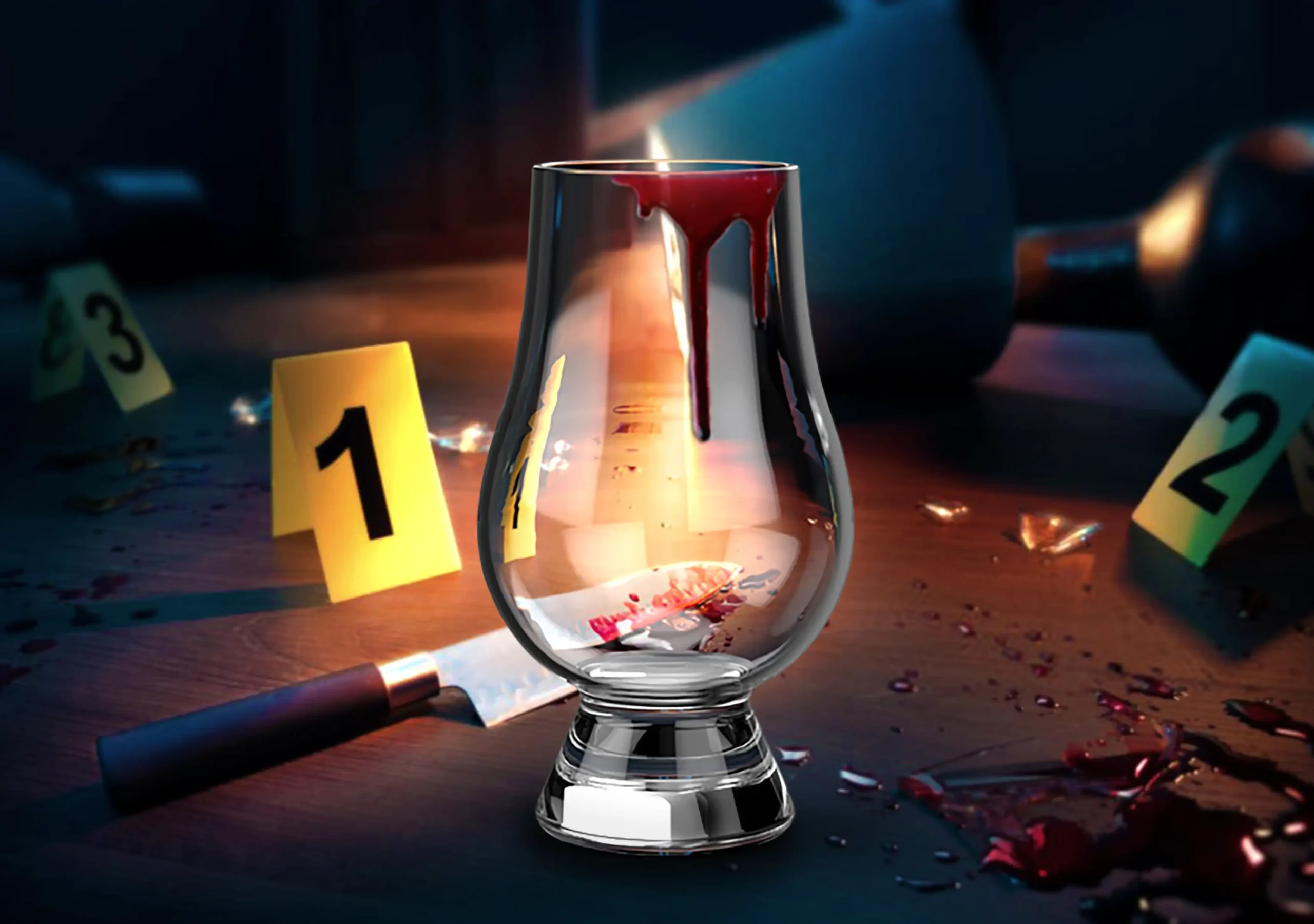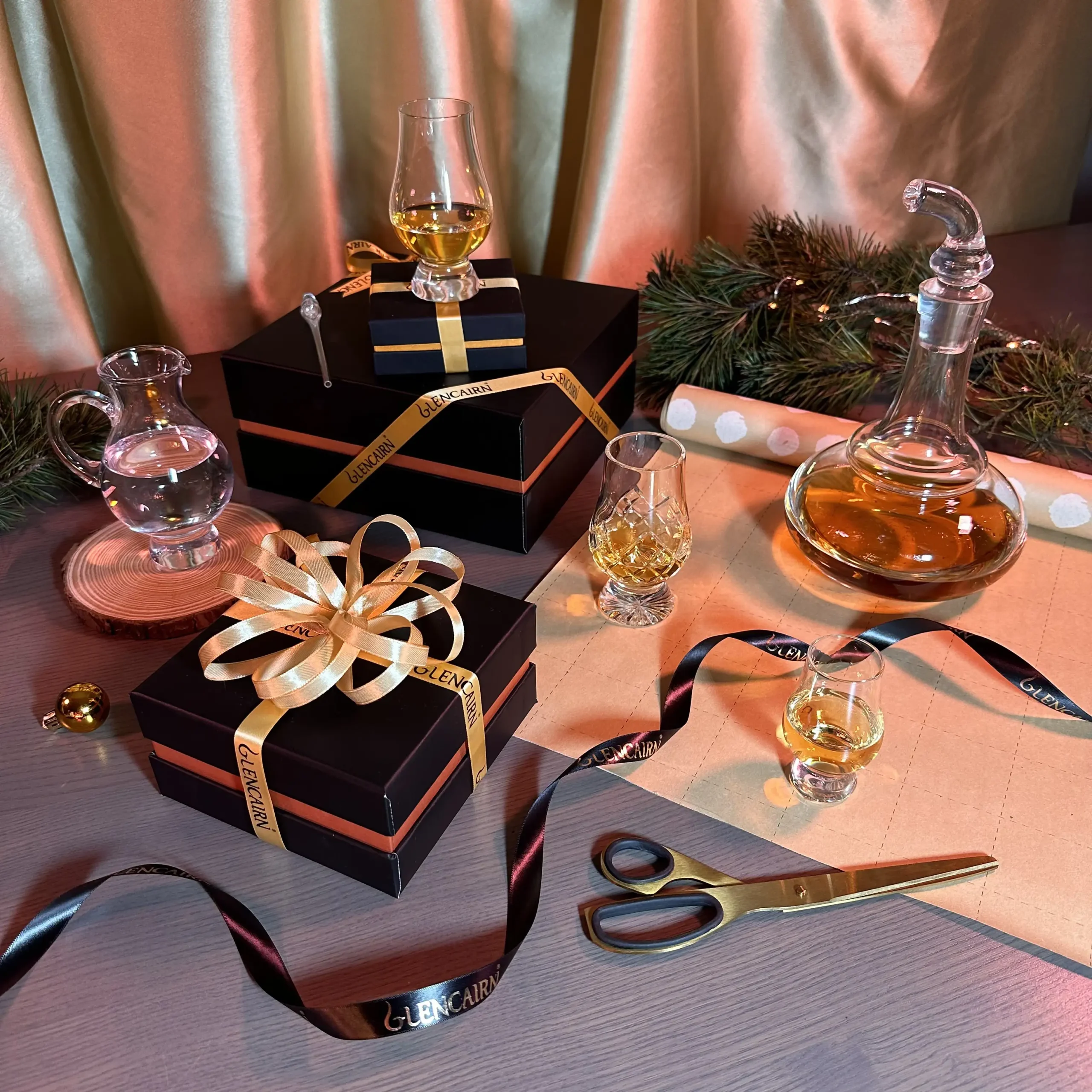Weekly Whisky News- 30th August
WEEKLY WHISKY NEWS
Friday 30th August
Read on to get your weekly dose of news all about the UK’s latest whisky launches.
Every Friday we will bring you a quick round up of everything you need to know about what’s new in the world of whisky.
Moët Hennessy & Beyoncé Launch SirDavis Whisky, While Bowmore Marks 250 Years with New Ranges
The Single Cask Unveils Rare Teaninich Whisky for Charity, as Tomintoul Introduces Three New Cask-Finish Expressions
The Glenturret Releases 'Still Life Summer' Whisky in Latest Series by Bob Dalgarno
- Scotland’s oldest working distillery, The Glenturret, launched Still Life Summer, the latest instalment of their Whisky Maker Bob Dalgarno’s Still Life series: Read More
For more on the latest whisky releases, join us at The Whisky Hub – Weekly Whisky News – every Friday
Introducing The Glencairn Copita - The Blenders Choice
Introducing The Glencairn Copita
Watch our new video featuring The Glencairn Gin Goblet, An essential tool in blending labs and distilleries worldwide.
Why is the Copita a go-to choice with master distillers and blending labs?
The Copita Glass is the go-to choice for master distillers and blending labs because of its specialized design tailored for whisky analysis and appreciation. Its elongated tulip shape, longer stem, and flared rim make it ideal for capturing and concentrating aromas, allowing professionals to discern the subtlest nuances of whisky. This glass facilitates easy inspection of the liquid’s colour and clarity, essential for evaluating whisky quality and consistency. Its crystal construction ensures clarity and purity, providing a clear view of the whisky’s characteristics.
Can you use the Copita with other spirits?
Absolutely! The Copita Glass isn’t limited to whisky; it’s a versatile choice for enjoying a variety of spirits. Whether it’s rum, tequila, brandy, or even gin, the Copita Glass can enhance the tasting experience across different types of spirits. Its shape and design, particularly the elongated tulip bowl and flared rim, are well-suited for capturing and concentrating aromas, which is crucial for appreciating the complexity of any spirit.
So, whether you’re exploring the rich flavours of a single-malt Scotch whisky or savoring the delicate notes of a premium tequila, the Copita Glass enhances the tasting experience, making it a versatile option for spirits beyond whisky. We have noticed that a lot of tequila tastings have now adopted the glass as their go-to choice for sipping on tequila and mescal. So the possibilities are endless on which this glass is not restricted to one spirit.
What does the future hold for The Glencairn Copita?
The future for The Glencairn Copita Glass looks promising as its popularity continues to grow among whisky enthusiasts, professionals, and even across other spirits like tequila and mezcal. With its versatile design and ability to enhance the tasting experience by capturing and concentrating aromas, the Copita Glass is likely to become even more widely adopted in both the whisky industry and beyond.
As the global interest in whisky and spirits education rises, The Glencairn Copita Glass is poised to play a significant role in tasting events worldwide, educational courses, and distillery tours. Its association with reputable distilleries, whisky influencers, and industry organisations further solidifies its position as a premier glassware choice for serious enthusiasts and professionals.
A Recipe for Stovies by Philip Wilson

A Recipe for Stovies By Philip Wilson

Jump to recipe
With the winter nights truly upon us and the weather turning increasingly horrible, there’s no better time to indulge in this moreish Scottish classic. You don’t need much in the way of equipment, maybe a slow cooker if you have one. The main thing is patience. To fully appreciate this recipe, things need to gradually reach boiling point over time.
For those of us of a certain age, stovies will bring to mind wonderful memories of grannies’ kitchens saturated with the whiff of this stew. I remember my own granny would gather up all of the slightly sad looking veg leftover at the end of the week and whatever meat was available and chuck the lot into the Big Pot. The Big Pot was like a cauldron where magic took place; it had the power to transform some of the most miserable ingredients into life-giving nourishment.
That’s the big benefit of stovies: you don’t need to be a particularly skilled cook. You can hide a multitude of sins in the thick gravy!
Stovies were one of my late husband’s favourite things to eat. I don’t think a month went by during our marriage when he didn’t ask me to whip up a big vat of the stuff for him. His love for gravy-drenched slice (that’s square sausage to some of you) was legendary, and it was more than apparent by the excess of gut that drooped over his stupid too-tight denims. I don’t miss the touch of that clammy cushion of flab weighing down upon me whenever I was to perform my wifely duties. Or the many other times that the bastard pressed himself on me without invitation.
My husband was a man of passion—for the football, for the horses, for creative prejudices that couldn’t even be semi-excused as those shared by other bigoted men like him. He seemed to have his own take on the world, a singularly nasty and twisted perspective on things. But there are a lot of other bigoted men like him. You might be married to one yourself, in which case this recipe is for you.
The stovies I made for my husband used the cheapest cuts of meat I could find, usually from the reduced bin. Take your time over this part. Forage deep in the fridges to find the slimiest, smelliest, dodgiest looking cuts you can find.
If you’ve read this far and haven’t clicked the “Skip to recipe” button, I applaud you. I often joke with a couple of other food bloggers that nobody ever actually reads our stories; that we could write or confess to anything in these few hundred words above an ingredient list and nobody would ever know. I’m no better, right enough. I skip to the recipe, too. But then I’ve had a lifetime of deferring satisfaction and enduring seemingly endless unpleasantries. I’ve paid my dues, so to speak, and I mean to spend the rest of my life skipping to the good bit.
I’ll say it outright: I killed my bastard husband. I put a handful of Destroying Angel mushrooms in his stovies one night, ten years ago (Google them, I won’t link to anything here). I sat back and watched as he dribbled down himself in a claggy death rattle, keeled over out of his chair and vomited his insides out.
It’s a strange sight, a grown man writhing in distress and pain. It simultaneously makes a baby and a beast of them. I didn’t do much research beyond what I needed to know: vomiting, diarrhoea, dehydration, liver damage. He had stolen and squandered enough of my precious time and attention over our lives together. I didn’t feel his death was owed any more of it.
I’m not a naturally scheming or vindictive woman, but it’s amazing the things you can learn from these true crime podcasts and books. It’s been a bit of a golden era for offing abusive husbands, I think. If you’re thinking of doing it yourself, I say why wait? Do it now while the going is good. Before people start checking who’s really listening to these serial killer shows. Many men, especially those of my husband’s ilk, don’t realise that the most dangerous person in their life is unlikely to be some other egotistical has-been squaring up to them in the pub, but the person that cooks their meals, washes their drab, stretched clothing, and raises their kids. The people behind the scenes of a life are the ones best positioned to ruin it if they must.
And I have raised that arsehole’s kids. Bought their Christmas and birthday presents, made their packed lunches, sung their bedtime stories, while he fused his backside with the sofa that I picked out.
I was going to wait until the kids were older before I did it. I thought they should be mature enough to deal with the grief of losing a father, but the longer it all went on, the more I worried about my daughter and the example it might set if she saw me settling for what I was given. And I was given it at least one night per week. Twice when his team played, or his coupon didn’t come in.
In the end, they managed just fine without a father. They didn’t miss what they never had in the first place.
These days, when I make stovies, I buy the nice stuff, like slice from my local artisanal butcher, with little black pudding medallions in the centre. It’s something of a treat for me now. It has sentimental value, so I like to make sure it’s as good as it can be.
The night of my husband’s last serving of stovies wasn’t remarkable. I couldn’t tell you what day of the week it was without looking back over obituaries and records and all sorts. On paper, it was a significant, traumatic evening. But for me, it was just another Tuesday or Thursday, only this time it had a happy ending. Had he been out at the pub, or had he been drinking at home? I honestly can’t remember. Either way, there was the tell-tale whiff to his breath when it slithered down my neck and curled under my collar. And his hands had the bloated, clumsy touch of too much alcohol. Or not enough.
My husband thought I was something that would chip away over time with repeated wear and tear—something he could beat into a more acceptable shape. And I mean “beat” in the truest sense. But he was wrong. Every time he raised his hands to me, I was being tempered, honed. And on that particular night, I moved from theory to action.
Fortunately, the kids were out of the house and staying with friends. I was spared the responsibility of trying to muffle and bite back my loud protests against my husband’s actions as I usually had to. The pain and humiliation were one kind of torture, but the idea of my children hearing it through our thin walls was something I could barely fathom. Many nights when I would tuck them into bed, I’d be unable to make eye contact with them in case we traded a silent acknowledgement.
Yet, funnily enough, on that night when I could have been as loud and hateful as I wanted, I was silent. We’re always told that it’s impossible to achieve important things while distracted, with our minds on our dinner. But I was planning this very recipe as I endured his pissed-up punishments.
When he was finished with me, and he slouched from the room, I set to work on his stovies. He’d worked up an appetite with all his exertions.
One thing I do know for certain is that the last thing his watery, piggy eyes ever saw was me. I showed no remorse as I sat by his bedside for two days, watching him twist with a flexibility I’d never have guessed of the lazy arsehole. Of course, it wasn’t quite the way I dreamed it, but then nothing in life (or, I suppose, death) ever is. I fantasised for years about violent revenge, long monologues when I had him at my mercy, sinister torments and so on. But I’m nothing if not a conscientious mother. I had to do something less obvious that wouldn’t arouse suspicion, so that I could still be there for my children. Besides, anybody who knew my husband and his habits and his diets would have expected nothing less than eventual liver failure. The mushrooms just sped things up. To be honest, falling foul of a mouthful of fatty meat was probably his ideal way to go. He deserved worse.
Now that both my children have grown up and flown the coop, I have no fear in confessing to the killing. It felt dishonest to enjoy this second wind I’ve found as a food blogger while never discussing my finest dish. It’s time to come clean.
If you intend to follow my lead, make sure to add only as many of the mushrooms as is required for the desired effect. Don’t be tempted to “over season” the dish. You’re aiming for subtlety. You don’t want anything to be easily traced back to you. Just a small amount right at the start. Make sure to mix them in and give them time to cook through the sauce to mask any strange tastes.
If you’re still here, then I thank you for listening to what I have to say. It’s an experience I knew very rarely in my time as a married woman, and I take it to heart when my words are met with genuine attention.
I think the real test will be to see how long it is before someone comes knocking at my door. Then we’ll know who actually reads these blogs. I almost hope to get arrested. It’ll be proof that one regular woman’s story didn’t go unacknowledged.
And to Josh and Beth: if you read this, or any part of this ever comes to light, I want you to know that your father deserved it, and that you were never to blame. Please don’t take the news too harshly. I would hate for this to ruin stovies for you.
For best results, let the stew simmer for a good few hours. Allow it to bubble away by itself and resist the urge to stir the pot unnecessarily. Try and find some good rustic bread or oatcakes to dip in the gravy, when it’s ready. You don’t want a single drop of your hard work to go to waste.
Ingredients
50g butter or lard
1 onion, roughly chopped
½ turnip (around 400g), peeled and cut into 2cm cubes
2 large carrots, peeled and cut into 2cm cubes
2 celery sticks, roughly chopped
200g chestnut mushrooms
(optional) additional handful of Destroying Angel mushrooms
350g slice (square sausage or “lorne” sausage)
350g roast meat (lamb or beef), or corned beef
700g potatoes, peeled and cut into cubes
700ml beef or lamb stock
Oatcakes or crusty bread, to serve
Method
1. Heat the lard or butter in a pan. Add the onion and fry until softened. Add the veg* and fry for 5 minutes. Remove the veg from the pan and set aside.
2. Add your meat to the pan and fry off in the residual butter.
3. Add your meat, veg, and potatoes to a large pot or slow cooker and pour over the stock. Season generously and let cook on low for 3-4 hours.
*Consult the ingredients list for full veg break down
Comments (3)
Marjorie.Bellamy
Love this! 🙂
S_Donaldson7
Havent had stovies for years cannae wait to try this
Mary909
I will make this for my husband this weekend as a well-deserved treat.
The Strange Sheep of Greshornish by Elisabeth Ingram Wallace

The Strange Sheep of Greshornish by Elisabeth Ingram Wallace

The Strange Sheep of Greshornish
Poison is a funny thing. People assume it comes in a black bottle etched with a white skull and crossbones, but they are wrong. Poison comes in less solid, less black and white forms.
Some say drink is poison, and they are wrong about that, too. I make sure to pour a little whisky in my Thermos full of coffee every day, and honestly, I am indebted to the stuff. It has got me through many a damp day manning the tourist information booth at the Fairy Pools car park.
The tourists have so many questions. It helps to have a little inner glow to get me through a shift without drowning one of them in a rock pool.
Where are the Fairy Pools? (right in front of you, moron, walk a mile)
Will it stop raining today? (no)
Is there anywhere to buy food that isn’t chips? (no)
Are there real Fairies here? Can I see one?
These people are inevitably children, American, and/or have watched too much ‘Outlander’. When it comes to magic, I say, maybe it’s better not to look too closely. You can’t put a microscope to a fairy.
Still, not everyone wants to take life lessons from a drunk woman in a plastic kiosk.
Fair enough.
I get many predictable questions every day here, but my least favourite one is always asked after a disappointing trudge to the pools with five-thousand other disillusioned day-trippers.
Where is the best wild place to go on the island? For the real island experience?
The question is rarely accompanied by a smile, or any consideration for me. It is my land after all. My reality.
But, I don’t mind. Not really.
I suppose I even understand.
I can’t even hate them anymore. By the time the tourists come to my carpark, depressing reality has hit, hard. They have often driven for hours before they cross the bridge, or travelled on a toddler ridden vomit-stinking car ferry, and flown oceans, and driven north for hours, only to land here, in this tarmac wasteland. The island is not what they expected, back when they were booking their trip in Texas or Mumbai or Croydon. Where are the tartan clad chieftains, the handsome maidens in a fairy glen, the native forest, the mist, and monsters? It’s all 1970’s bungalows and white-sliced-bread, sheep farming and Nescafe. I see their nausea and disappointment. Aren’t the Fairy Pools supposed to be shimmering crystal depths of aquamarine ice? Why do I have to pay for a car park? The public toilet is blocked.
The farming shocks people, too. The extent of it. The industry of it, on an island they were hoping to be full of hobgoblins and bagpipes.
Some days I even feel it myself, the pall of tractors and corrugated barns, the stink of diesel, the oily slick of traffic jams and tourism.
Still, it’s all quite functional, at its core. Although I appreciate not everyone loves function. They want enchantment.
Once Skye had many Gods, and all the monsters you could dream of – as well as Selkies and fairies that fluttered about in the full-moon, flitting between myth, devilry, and human form. But Skye only has two monsters now – farming, and tourism – and so, visitors are disappointed.
And to be fair, the tourists often disappoint me, too.
The bad ones, anyway. The ones I see throwing their Costa Coffee cups in the Fairy Pools as they take a naked dip with only a selfie stick and 50,000 of their closest Followers for company. These are the same ones that picnic on the ground and abandon their trash, their fag ends, vape pens and used condoms. They ‘wild camp’ in the grass, with disposable aluminium barbeques, burn holes in the moss and heather, scorch the peat, start wild-fires.
Shut the gates and bury your excrement, I want to say. And please, don’t shit directly on a fairy mound.
The good tourists take only memories, and leave only footprints.
And when the good tourists turn up, with a smile and a bin-bag to collect litter along the way,
I send them merrily on their way, with a map to my favourite walks, to the sea stacks, or the black sands where the golden eagles nest.
When it comes to the bad tourists, the ones who chuck Coke cans out their car window or drop steel-canisters of nitrous oxide in the carpark, I can be less kind. I like to send them on an alternative type of adventure. My hope is they will find themselves.
These days, when the bad sort come whinging to me for advice – Where’s the real Skye? – I answer them as honestly as I can.
You have to drive north, I say. Far north. To the tiny peninsula of Greshornish.
In Greshornish, the true spirit and soul of Skye will enter you. The place has something unique that never leaves you. But remember, I say, the wee folk are not all of the happy-go-lucky Seelie Court. Some of them are mischievous – so behave – I say, I smile. I warn. I offer them the option. No one can say I don’t do my tourist guidance job well. Then I drink from my Thermos until I feel myself shimmer, and we all go on our way.
I live in hope. I’m positive, cheery even, and on the good days I don’t need to hand out a single map of Greshornish.
On the bad days, I leave it to the island. The island has its ways. You just have to pay attention to how a place feels, and react accordingly.
For example, it still feels isolated in Greshornish, because it is. There is less modern life there, less hurly-burly, and zero farming. Sheep have never been grazed on the peninsula, because it was said the fairies will enchant them and make them run around in circles until they die.
The tourists often laugh at this, raise an eyebrow, but you can’t ask a local who lives among the fairy folk to tell you a fairy tale, without expecting a little darkness and a few possessed zombie farm animals. Especially when it is 3pm and I am coming to the end of my Thermos.
No, believe me, it’s true, I tell the tourists, as they start checking their phone signals and Googling up Wikipedia, asking Siri to prove me wrong.
The fact is, it is all true. In the mid 1800’s the new owner of the Greshornish estate didn’t believe in the fairies either, and decided to scientifically investigate the mystery of the mad, dead sheep.
He sent his people to gather up local flowers and weeds and whole sacks of fauna, to have the plants tested by experts in Edinburgh, for poison.
Naturally, they found nothing. The plants and grasses all came back proven innocent, and entirely devoid of magic.
As if poison is that easy to find. As if it is stupid enough to glow pink in a test tube, or throb under a microscope.
Vindicated, the landowner put out fifty sheep to graze.
Within a month they ran around in circles. In another month, they were all dead.
Magic said the locals.
Fairies.
Anyway. Greshornish is a magical spot, I tell the tourists. You have to see it to believe it; the wet grass is thick with dew and lush with moon and the gorse is butter yellow and smells like fried pineapples. Everything is a little flusher and a little plusher there, and as for fairies – well. You will have to decide for yourself.
You should go. Look, but don’t touch.
The tourists drive off there at a thousand miles per hour, hoping to find a unicorn.
They don’t need to hear the rest of the Landowners life story. Many years after his sheep all died, and died again – he employed a new botanist to take a second look at all the plants he suspected to be poisonous – and the new botanist found them to be covered with tiny snails. Perhaps the snails were the mystery toxic element?
Again, this turned out not to be so.
A decade passed.
The Landowner attempted – again and again – to graze new flocks of sheep at Greshornish, with the same maddening, deadly result. Eventually, tired, furious, bitter, and broke, the elderly Landowner took a dead sheep and some snail covered plants to an even more eminent scientist, to crack the mystery of the mad sheep, before he died.
The eminent scientist discovered microscopic creatures living within the tiny snail shells. Parasites. These same monstrous tiny critters were soon found living inside the autopsied brains of the sheep.
It turned out, merely lollygagging among the fields of Greshornish was enough to turn the brains of the sheep. Take care – warned the scientist, the brains of humans may be susceptible too.
But only if those humans were stupid. Stupid enough to linger, and to scrabble around like animals in the long grass, lighting up a barbeque on the ground, say, or ‘wild’ camping on endangered flower meadows, or shitting on a grassy hillock, drunk swimming and drinking from the deep snail filled waters.
But, as I say, I don’t like to ramble on. Giving them the full story would only ruin the tourists’ days. They want to experience the real Skye after all, with all our real fairies and real monsters. I try to give them what I can. I like to smile, and let them have their magic. As far as I am concerned, they can go to Greshornish and tread lightly, or they can go to Greshornish and swim and trash and hump and sleep wild, and then go home to Texas, and Mumbai, and Croydon, to walk around in circles forever, until they die.
The Glencairn Glass Crime Short Story 2023/24 Winners

Scottish stovies and strange sheep are announced as the winning entries for The Glencairn Glass crime short story competition
A sinister story involving a Scottish recipe for ‘stovies’ and a grisly tale about the strange sheep of Greshornish have been chosen as the winning and runner-up stories in The Glencairn Glass crime short story competition this year.
The world’s favourite whisky glass – the Glencairn Glass – produced by Scottish glassware company Glencairn Crystal, has announced the winning author as Philip Wilson, and the runner-up author as Elisabeth Ingram Wallace, in its annual Scottish themed crime fiction competition, now in its third year.
Having supported and celebrated Scottish crime writing talent with its ongoing sponsorship of the prestigious McIlvanney and Bloody Scotland Debut crime-writing literary awards since 2020, the Glencairn Glass launched its very own crime short story competition in 2021.
The competition is run in partnership with Scottish Field Magazine and the Bloody Scotland Crime Writing Festival. Both novice and experienced crime writers are invited to curate “a crime story set in Scotland” in no more than 2000 words.
Over 140 stories were entered into the 2023/24 competition and the winner and runner-up were selected by a panel of three judges including Callum McSorley, a Glasgow based writer whose debut novel Squeaky Clean won this year’s Bloody Scotland McIlvanney Prize for the Scottish Crime Book of the Year. He was joined by Kate Foster; the Edinburgh based national newspaper journalist and author, whose debut novel The Maiden won this year’s Bloody Scotland’s Debut Prize. The third judge was Glencairn Crystal’s marketing director and experienced crime writer Gordon Brown.
Winner
A Recipe For Stovies by Philip Wilson
by Philip Wilson
The gruesome confession of a food blogger who sought revenge on her violent husband after suffering years of domestic abuse.
Philip Wilson is a writer living in Glasgow. He divides his free time between trying to wrangle his rebellious dog and writing off-kilter short fiction. Time and imagination willing, he’s planning to set to work on a full-length novel soon.
Philip said: “I’m ecstatic and really honoured to be selected as this year’s winner of the Glencairn Glass Short Story Competition. I stumbled across the competition by sheer luck but knew immediately that I wanted to submit something. No matter what I write, an element of Scotland seems to worm its way into the material somehow, so a crime story set in Scotland was the ideal opportunity to be playful with it. I just hope my story doesn’t put anyone off of stovies. It’s usually quite a benign dish, cholesterol notwithstanding”.


Runner-up
The Strange Sheep of Greshornish
by Elisabeth Ingram Wallace
A sinister tale of a disillusioned tourist guide on the Isle of Skye who sends badly behaved tourists to suffer the same fate as the mad sheep in Greshornish.
Elisabeth Ingram Wallace lives in a Skoda in Scotland, usually somewhere in the Highlands. Her short stories have won prizes including The Mogford Short Story Prize, ‘Writing the Future’ and a Scottish Book Trust ‘New Writers Award.’ Recent work has been featured in SmokeLong Quarterly, Atticus Review, Barrelhouse, Wigleaf, and anthologies including ‘FUEL – an anthology of Prize Winning Flash Fictions’.
Elisabeth said: “Thank you so much to the judges and to all at the Glencairn Glass, I am delighted to be the runner-up in such a fantastic competition. It is a great challenge to write such a short Short Story; under 2000 words is my absolute favourite length, a test to write but long enough to go a little wild and include the odd zombie sheep. I wrote this story in a Bothy near Neist Point over Christmas, while it rained and rained and rained, and it was a real escape to go and commit a few imaginary murders in the sunshine”.
Competition judge, Callum McSorley, commented: “It was a real honour to read the brilliant work submitted, and certainly made for some lively discussion during the judging process. The winner’s clever story format made excellent use of the limited space to tell a story equal parts funny and sinister which pulled all the judges in immediately. The runner-up’s scuzzy subversion of an imagined, idyllic Scottish Highlands was similarly smart, comic, and dark.”
Kate Foster said: “It was a huge pleasure to read such a brilliant variety of crime stories, and to see the talent in Scottish writing. The judging process was great fun with lots of debate, but we were unanimous in our favourites. The winning entry stood out to me as it was funny, clever, and served up with a flourish. The runner-up was brilliantly written with a really quirky twist.”
Glencairn’s marketing director Gordon Brown said: “The quality of the short stories we receive every year is amazing and as both a crime writer and the Marketing Director of Glencairn Crystal I’m delighted that a competition based around Scotland and Crime Fiction can deliver such great works”.
The first prize of £1,000 goes to Philip Wilson and runner up Elisabeth Ingram Wallace receives £500. Both writers also receive a set of six bespoke engraved Glencairn Glasses. The winning story will be published in the May issue of Scottish Field Magazine (on shelf from 5th April) and the runner up story will then be published on Scottish Field Magazine’s website; www.scottishfield.co.uk. Both stories will also be available to read on the Glencairn Glass website: www.whiskyglass.com.
Last year’s short story competition was won by Frances Crawford from Glasgow, whose captivating tale The Dummy Railway told the story of a disturbing discovery through the eyes of a young Scottish girl. All previous winners’ stories can be viewed at www.whiskyglass.com
For further information about this year’s McIlvanney and Bloody Scotland Debut crime-writing prizes, as well as the Bloody Scotland Crime Writing Festival taking place in Stirling, Scotland, from the 13th to 15th September, please visit www.bloodyscotland.com.
The Glencairn Glass crime short story competition is back

The world’s favourite whisky glass – the Glencairn Glass – is once again delving into the dark side of crime fiction with the launch of its popular annual crime short story competition.
This year it launches on 27th October, once again in partnership with the Bloody Scotland International Crime Writing Festival and Scottish Field Magazine, offering the winning writer a prize of £1,000 and their story published in Scottish Field and online.
Over the last two years the competition has attracted hundreds of entries from both experienced and novice crime writers internationally. Writers from around the world are invited to compose their stories, in less than 2000 words, on the theme: “A crime set in Scotland” – the competition closes on 31st December 2023.
In addition to the £1,000 prize, the winner will also see their story published in Scottish Field Magazine in the spring. The runner up will receive a cash prize of £500. Both stories will be published online on the Scottish Field website, as well as on the Glencairn Glass website (whiskyglass.com).
The Glencairn Glass is no stranger to the ‘dram-atic’ world of Scottish crime fiction. The Scottish family business Glencairn Crystal has celebrated and supported the Bloody Scotland Crime Writing Festival since 2020 with its Glencairn Glass sponsorship of the McIlvanney Prize for the Scottish Crime Book of the Year and the Bloody Scotland Debut Crime Novel of the Year awards. Earlier this year a new three-year deal was agreed to secure the company’s commitment and sponsorship until the end of 2025.
The judges
This year’s Glencairn Glass short story competition judging panel includes Callum McSorley, a Glasgow based writer whose debut novel Squeaky Clean won this year’s Bloody Scotland McIlvanney Prize for the Scottish Crime Book of the Year. He is joined by Kate Foster the Edinburgh based national newspaper journalist and author, whose debut novel The Maiden won this year’s Bloody Scotland’s Debut Prize and has become a Times and Waterstones bestseller.
Glencairn Crystal’s marketing director Gordon Brown, who is also one of the founding directors of the Bloody Scotland International Crime Writing Festival, is the third judge. Gordon, who is also a crime writer, has had eleven crime and thriller books published to date.
Gordon commented: ‘We are delighted to set out on the search for a great Scottish set crime short story once more. The Glencairn Glass’s sponsorship of the crime writing prizes at Bloody Scotland and its success globally, makes it the perfect glass to toast all those writers that are about to sit down to pen a classic crime short story.’
Previous winners
Last year’s short story competition was won by Frances Crawford from Glasgow, whose captivating tale The Dummy Railway told the story of a disturbing discovery through the eyes of a young Scottish girl. Frances graduated last year, at the age of 60, with an MLitt (First) in Creative Writing from Glasgow University and says that winning the competition has opened many doors for her.
Frances commented: “What attracted me to the Glencairn Glass Crime Short Story Competition was the fact that it is so inclusive and open to everyone, whether absolute beginner or published author. Since winning, I developed The Dummy Railway as a full-length novel, with very promising agent interest. It was an honour to win such a prestigious prize. I would encourage crime writers at all stages of their writing path to enter”.
The winner of the first Glencairn Glass Crime Short Story Competition in 2021 was Brid Cummings, a fiction writer and occupational therapist in South Australia. Her story Halmeoni’s Wisdom was a dark tale of human trafficking, illegal trade and a desire for freedom. Winning the competition gave Brid the confidence and encouragement to complete her psychological suspense novel and she has recently been signed up by a UK literary agency.
How to enter
All short story entries must be submitted at www.whiskyglass.com/crime-short-story-competition. The competition closes at midnight on Sunday 31st December 2023. The winner and runner up will be announced in March 2023.
Bloody Scotland’s Festival Director, Bob McDevitt, said: “Bloody Scotland has always been dedicated to supporting and discovering new writing and this short story competition provides a great opportunity for writers to flex their creative muscles and explore the broad church of crime writing.”
Gifts For Whisky Lovers
Gifts For Whisky Lovers
The Perfect Whisky Gifts for Whisky Enthusiasts this Christmas
With Christmas 2023 fast approaching, you might be on the lookout for the perfect gift for the whisky lover in your life. If that’s the case, we’ve got you covered. From neat stocking fillers, to bigger whisky gifts for under the tree, we’ve curated a list of our top gifts for whisky enthusiasts this Christmas.
Personalised Glencairn Glass
The perfect gift is one that carries a personal touch. What better way to demonstrate your care for your whisky-loving friend or family member this Christmas than with a Personalised Glencairn Glass? It can be engraved with a name and a heartfelt message, and you can select from our exclusive limited-edition Christmas designs. It’s ideal as a stocking filler or an addition to another gift.
PRICE – £6 / £16 PERSONALISED
Cut Glencairn Gift Set of 2
The Cut Glencairn Gift Set of 2 is an excellent choice for a premium gift. These Glencairn glasses are cut with a crystal design that adds a touch of elegance. Hand-crafted with precision. The set of two glasses is perfect for sharing a dram with a friend or loved one, making it an ideal Christmas whisky gift.
PRICE – £50 / £60 PERSONALISED
BLIND TASTING SET
Discover our Coloured Whisky gift sets – ideal gift ideas for whisky lovers. Elevate your festive whisky tasting with the Glencairn Blind Tasting Set. It features five colourful Glencairn Glasses, including the option to choose Christmas colours, perfect for enthusiasts who enjoy blind tastings, adding excitement to their holiday sessions.
PRICE – £55 / CHRISTMAS COLOURS £55
DECANTER GIFT SET
Our Decanter Gift Set offers a touch of luxury. The set includes an uncut and hand-polished crystal decanter, accompanied by four Glencairn Glasses. It comes in a luxurious gift box lined with black satin, and you even have the option for personalising it with a Christmas message or Design. Perfect Christmas Whisky Gift for the whisky lover in your life.
PRICE – £116 / PERSONALISED £126
The Glencairn Travel Gift Set
The Glencairn Christmas Travel Set – your ideal festive whisky companion on the go! This special holiday edition includes a Glencairn Travel Kit with 2 glasses, a handy flask, a Glencairn lanyard to secure your glass and a stylish Glencairn hat. A Glencairn Christmas for a fan of the brand.
PRICE – £56
PREMIUM WHISKY BUNDLE
The Christmas Premium Whisky Bundle is the perfect choice for those seeking a complete whisky tasting experience during the holiday season. This exquisite set includes two cut crystal Glencairn glasses, a conveniently handled water jug, and a pipette, making it an ideal gift for whisky enthusiasts looking to elevate their festive whisky moments.
PRICE – £76.50
GLENCAIRN TASTING PACK
The Glencairn Tasting Pack has been specially crafted as the ultimate Christmas whisky gift. It features four Glencairn Glasses, four Tasting Caps, and a Glencairn Glass Pipette, all elegantly presented in a specially designed gift box and festive sleeve. It’s the perfect choice for a Christmas whisky-tasting session.
PRICE – £50 / £60 PERSONALISED
Couriers are expecting increased volumes over the Christmas period, please allow extra time to ensure your order will arrive in time for Christmas.
With this in mind, we have set the following dates:
International Personalised Orders – 4th December
UK Personalisation Orders – 11th December
International Blank Orders – 11th December
UK Blank Orders – 17th December
Crime Short Story Competition rules and regulations

The Glencairn Glass short story competition - Competition rules and regulations:
The competition is open to all writers worldwide, published and unpublished, who are over 16 years old by 23rd October 2023.
Stories entered for the competition should not have been previously published in any format, online or print, self-published or paid.
Entry format required:
-
- All stories must be in English, ideally 1.5 or double-spaced, 12pt.
- Files must be in Microsoft Word (.docx or .doc), rich text (.rtf) or in PDF format.
- The title of the story and page number should appear on every page. This should be inserted using the header format option.
- The total number of words excluding the title, should be listed at the end of the story. The maximum is 2000 words.
Submission: All stories must be submitted via the online entry form. Submissions are limited to one per author. No corrections can be made after submission.
Copyright: All stories submitted must be original, fictional, and entirely the author’s own work, not infringe the copyright or any other rights of any third party and not be defamatory of any living person or corporate body. All stories by finalists that are published on our website or in Scottish Field will be credited. The author will retain the copyright to their story.
Publication: Publication for the winner and runner-up will be online via the whiskyglass.com website and also at Scottish Field Magazine online. The overall winning story will also published in Scottish Field Magazine in the spring (2024).
Judging: All entries will be judged by a team of readers. A short list will be drawn up by this team and the final judging to select the winner and runner-up will be undertaken by the panel of three selected judges. The judge’s decision is final. Glencairn Crystal Studio cannot enter into discussion with any entrant in the judging process. We cannot provide feedback on individual stories
Publicity: By entering this competition all writers agree that if they are the winner or runner-up, their stories may be published on the whiskyglass.com and Scottish Field websites and the overall winner will be published in Scottish Field Magazine and their work may be used elsewhere for publicity purposes.
All finalists in the short story competition will be informed by email / telephone by the end of February 2024

The Dummy Railway by Frances Crawford
The Dummy Railway
Sid Vicious is under the table, waiting to see if there’s any dropped food. I wait til Nana isn’t looking and I kick him. Right in the belly.
‘That poor dog must be bursting,’ Nana says. ‘Will you no take him out, Janey?’
She asks this every day but I can’t, not any more. It’s Sid’s fault that I found the dead body.
When I first went back to school, Nana had said nobody would know it was me that found Samantha Watson, and to tell them I was off with diarrhoea. I was just going to say sick. But they’d all heard and everybody crowded round.
‘Was it all blood and guts, Janey?
‘Did you shit yourself?’
‘Was the dead woman a nudie?’
I just stood there looking at the ground. Mrs Henderson came out and made them line up. She took my hand and we went in the teachers’ door and she was all nice and kind. But that made it worse and I wished she would just shout like normal.
Now, in the playground, nobody comes near me. Not even any of the Smelly Kellys. But this morning, Lorraine and Jackie run up to me.
‘Janey, look,’ Lorraine says, opening a packet of cheese and onion. There’s a bottle of nail polish in there, ‘It’s Boots No.7, Jackie nicked it off her sister.’
Lorraine used to be my best friend til I stopped talking. Now she’s hanging about with that Jackie. Don’t care.
‘Want us to do your nails?’ she says.
‘Look at mine,’ Jackie says, wiggling Frosted Pink in my face. Wiggling and wiggling til all I can see is Samantha’s nails, broken and filthy like she’d been scrabbling in the dirt to get away. Suddenly, I feel Samantha’s smashed-up hand in mine, cold and heavy.
‘Just, just get lost,’ I shout and push Jackie. Just a toaty shove, I didn’t mean her to fall.
When I get home, Gibby from the 18th floor is outside fixing a motor. He’s always messing with broken stuff. He wipes his filthy hands and walks me to the lifts. Rain leaks into our block, and Gibby has the top floor damp smell.
‘The polis are in with your granny,’ he says. ‘Don’t you let them hassle you, pal. Yous just give me a shout if they start any of their shite.’
Gibby’s OK, Nana used to think he was a bad devil, but then he fixed her radio and wouldn’t take any money.
Two police are here this time. The woman who tells me to call her Carol, and the baldie man who wears ordinary clothes. They’ve got tea but Nana’s not put it in the nice cups. And there’s no biscuits out.
‘Hey, Jane. Good day at school?’ Carol says, ‘You must be excited about going up to big school soon.’
“Big school” You’d think I was six or something, what a diddy.
‘It’s Janey,’ I tell her. Five weeks and still getting my name wrong. She makes out she’s writing it down on her hand with an invisible pencil. Stupid.
‘Love your wedges,’ she says, as if she’s my friend or something. I look at my feet and think about my old shoes crashing to the ground. It was giving me the shivers to wear them, so I chucked them over the balcony, with all the other clothes I was wearing that day. Even my new Wombles t-shirt. Nana picked them up but she missed the pants and some wee boys are still using them for scabby-touch. She wasn’t angry when I told her why I did it but she had to see Big Davie to borrow money for new stuff. He’s got her Family Allowance book.
‘Take your jacket off, sweetheart. They want another word.’ Nana is still in her work overall, a day’s worth of pie-making right down her front. She puts the big light on. It’s usually just for Christmas and looking for her glasses.
Baldie takes out his notebook. Nobody told me his real name but his head is shiny and huge. He probably thinks he’s Kojak or something.
‘Right, hen. One more time, just in case you’ve remembered something.’
‘Oh, for Christ’s sake. The wean’s told you everything.’ Nana knows I’m not a wean, I’m nearly twelve, but I see what she’s doing.
‘Details can come back, often weeks later. And our Jane, sorry Janey, is a very clever girl,’ Carol says and gives me the smile again.
That day, at the police station, she had taken me to a wee cubicle to clean up cos I’d wet my pants. I heard her outside talking to a man who wanted to know if the witness was any use. “Doubt it,” Carol had said, “she’s from the Possil flats. Bloody lucky if she can write her own name.”
Baldie drinks his tea. I hear Sid scratching at the kitchen door, desperate to see the visitors and maybe bark to show what a good dog he is. I almost go to him.
‘Start at the point where you go to Martin Gallagher’s door.’ He’s clicking his pen, ready to go. On my knee there’s a scab exactly 37 days old. I pick it just enough for the wee drop of blood to come out. Now I’m ready too.
Martin opened his door. He was in his pyjamas, proper Star Wars ones, not fakes from the market. He gets nice clothes cos his ma works in Woolworths.
‘I can’t come, Janey. We’re going to the Botanics.’
I was really raging cos I got up early, ‘Well, you’re going to miss the Spitfire then.’
The firework was a belter, and we were going to let it off down the Dummy Railway. Martin looked pretty sad when we left, but he gave me some gammon for Sid.
You have to be really careful about going over the railings at the Dummy Railway. The jaggy nettles are murder. Sid gets excited off the lead and was going a bit mad, bouncing about in the weeds. There’s always a weird quietness when you get right down the embankment, like the air is too thick or something.
The plan was supposed to be to set the firework off in Blindman’s Hole. The echoes in that tunnel are loud enough to ache your teeth. A bend in the middle takes all the light away and even if you don’t believe the stuff about ghosts and skeleton bones, you still have to watch for glue sniffers and drunks. I was thinking I’d wait for Martin after all. But I had to get Sid. He’d run on ahead, and was making growly noises behind an itchy-coo bush. Maybe I would pick some to shove down stupid Martin’s stupid pyjamas.
But there was a stink.
‘You better not be rolling in keech again, Sid,’ I said out loud.
I wasn’t scared when I saw her, not at first. She was lying face up and her legs were apart but at weird angles. You could see right away that she was dead. There was a droning sound but I think that was just inside me. I knelt down beside her and a wee bit of broken glass went into my knee.
‘Why did you kneel down, Janey?’ The police always ask this.
‘I don’t know. I just thought…’ I thought she maybe wanted somebody with her, I thought she was maybe lonely. But I don’t say this because it makes me sound a bit mental.
‘This is the point that you touch Samantha’s dress.’
My face goes bright red. ‘There was blood all over her tummy. And–and down there. She had no pants on.’ I feel Nana’s hand on my shoulder. She reaches forward and wipes my knee with her hanky. I’ve gone too far with the scab.
‘And you don’t know how long you waited there?’ Baldie asks. I shrug. Long enough to see a big fat bluebottle crawl out of her mouth.
‘Have you remembered seeing anyone walking near the embankment?’
Again I shrug and Carol makes a sighing noise. I really don’t like Carol.
‘Right, that’s it,’ Nana shouts. ‘Yous already know about the taxi driver who called your mob. So there’s nothing more to be said.’ Nana’s wee and a bit fat but when she’s raging she looks proper hard.
‘Mrs Devine, please. About the taxi, Janey. You absolutely sure it was moving? Talk us through that bit again,’ Baldie says.
‘I don’t–I don’t really remember how I got to the main road.’ It’s like one of those dreams where bits are missing. ‘The taxi nearly hit me. That’s how I know it was moving. The driver got out and shouted at me to get off the effin road,’ – Nana doesn’t stand for swearing unless it’s about Orangemen – ‘but then he was staring at me, and he took my hand and sat me on the pavement. He pulled his taxi in and brought me one of those tartan blankets. He said he was Alex, Taxi Alex, and did something bad happen.’
‘Did he mention the body first? Think hard, hen.’
I close my eyes to remember better. Taxi Alex was chewing Juicy Fruit. He had very red hands and his voice was high, not like a man talking.
‘No,’ I say, ‘it was me that told him about, about…’
‘Did Alex leave you alone at all?’
‘Just for a wee minute. Then he came back and gave me a Wham.’
‘He gave you a what?’
‘It’s a sweetie,’ Nana says, and does a look cos taking sweets is not on.
‘It was for shock, Nana.’
‘This Alex character. Yous looking at him?’ Nana asks. I wonder what she’s meaning but guess it’s not good because her lips are that tight way.
‘We can’t discuss that, Mrs Devine.’ Baldie tugs at his trouser knees. ‘Right, hen, last question. We need to know if you did anything apart from touch the dress. Did you do anything else to Samantha’s body?’
He’s looking right into my face now.
‘No,’ I lie.
Later, Gibby comes to take Sid Vicious for a walk. Nana’s dead grateful and goes to get him a coffee. She hardly ever gives anybody her coffee.
I notice Gibby’s rubbishy tattoo, blue and smudged, near his wrist and I wonder if might be Rangers. He sees me looking.
‘Army,’ he says, holding his big arm out. ‘I seen bodies too, you know. Northern Ireland.’
I wish Nana would hurry up, I don’t want to be talking about this.
‘Do you see her in your dreams? The dead lassie?’ he asks.
I nod, ‘Every night.’
‘Aye, it’s rough right enough. Like having worms living in your belly. Bloody shame it had to be you that found her. All sliced up, that filthy word scrawled on her face.’
‘Take two, son,’ Nana says, passing a plate of biscuits over Sid’s head.
My mouth is filled with sick and I run to the toilet.
I wasn’t scared when I found Samantha, not at first.
‘You’re freezing, so you are,’ I said, patting her hand, ‘but I’m here now, you’ll be ok now.’
Then I saw a word on her forehead. I’d thought it was blood but it was the really bad swear written in red lipstick. I did a wee bit of spit on my hanky, like Nana used to do for sticky cheeks.
‘There, there, wee lamb,’ I said, rubbing and rubbing till only a bit of the C was left.
But then the bluebottle was on her teeth and I screamed. I was running and I was screaming, and I was in the tunnel with the skeleton bones and ghosts.
The police were raging when I said I’d touched her dress, so I never told them about cleaning the word on Samantha’s face. I never told anybody. Only the person who wrote it would know about it.
Only the murderer who is with my Nana, eating custard creams.
— Frances Crawford
The Last Tram to Gorbals Cross by Allan Gaw
Glasgow 1928
A bluebottle thuds against the pane. Reeling on the rebound, it staggers through the air searching for another exit. It exhausts the dull corners of the room, senses the light and tries the window again. Over and over, I watch it flying here and there and back again.
The buzz suddenly stops. It lands on the table inches from my hand, standing on the arc of an old tea stain. Its tiny body pulses and flexes, and black spiked legs turn it left and momentarily right. I sit frozen, watching it, imagining its thoughts. I do that with people too, like that first one.
In a blur, I jerk my hand and swat it, clipping its side. The mess of the insect glistens. I lean in. One broken leg is still reaching, trying to get some purchase. I breathe smoke over it and nudge the lit fag-end towards its one good eye, so I can listen to the sear. It can’t escape. It’s stuck to the table with its own guts. Done, I flick it. It hits the wall and falls into the shadows. No one’s ever cleaned back there.
In fact, the whole room is dirty. It’s deliberate — squalor helps un-nerve anyone who’s used to better. Not me, though. I quite like it.
Used to be white, but lots of fags have been smoked in here since. Now it looks like old men’s teeth. Smells too. Quiet though. Thick walls and there’s only that high window to let the street in. That’s the clattering of trams, rolling along Saltmarket. I like trams. Know them all. That’s the thirteen. Stops right outside the station. And there’s its bell. Goes over the Clyde and down towards Gorbals Cross.
No clock in here. They don’t want you knowing how long it’s been. They like to leave folk stewing. The longer the better. The not-knowing gets to them. But not me. I know their game. You just need to settle in. It’s a seat. Got my fags. And there was that fly.
*
At the far end of the duty room, D.S. Fyfe was fixing a large photograph to the pinboard. He knew he was being watched and probably pitied. However, he had no choice but to go along with what Chapman wanted.
It was only his fourth week working with the new senior officer. It was a recent promotion and before his time, some said. Chapman was certainly young. But worse than that, he was English.
On their first day, the new D.C.I. had made it clear how he worked. Now, as Fyfe stood at the board that Chapman had put up, he finished assembling all the evidence. Only the D.C.I. used this approach. It was an attempt to consolidate everything, and red strings were used to join apparently disparate pieces of the story.
Most of Chapman’s colleagues thought it was an affectation. It had certainly been new to Fyfe. However, he was already seeing its value because it helped see the bigger picture.
Fyfe secured the latest crime scene photograph — the third murder in a month. Three victims, all women, had each been attacked upstairs on a tram late at night. This photograph, like the others, showed a woman slumped and bloodied, her throat cut.
Unannounced, Chapman appeared at Fyfe’s side.
“Good, Sarge. Let’s go over this again.”
Chapman sat but expected Fyfe to stand, using the board to present the case clearly and logically. All the while, Chapman’s eyes would be darting from photograph to note, following the connections and formulating new ones.
“Sir, the first was Elsie O’Grady, twenty-five, waitress going home after work. Recently separated from her husband, she lived with relatives. Conductor found her on the upper deck just after midnight. The body position and blood splatter suggest she was attacked from behind while seated. Her throat cut in a single slash. No witnesses and, although there was plenty of blood, no footprints.”
Chapman nodded, urging Fyfe on.
“With the others, it’s the same story. Betty Devine, twenty-two, housemaid returning after a day off. And the most recent one, Millie Pollok, twenty. All killed upstairs on a late-night tram, throat cut from behind. The only difference with Pollok is there’s evidence of a struggle — skin under her fingernails. So, she must have managed a swipe at him.”
*
I’ll tell you one thing, this table’s seen better days. I don’t mind though. Gives you time to think.
The thing that surprised me when I got started was how many young women travel alone at night. Wouldn’t do that if I was a woman.
But it was quick. Wasn’t trying to make them suffer. And it was easy — just had to wait. I’d sit upstairs and when they came up, I’d crouch down. Most women are too busy fussing with their purses to notice. At night, the conductor usually takes their fares downstairs. That helped.
After they settled, I just had to pull their heads back with one hand and take the razor hard across their throats with the other. Their blood would splash the electric bulbs above them. They would be in a pool of pink light while they died. Lovely. Couldn’t stay, though. I had to climb over seats to get out.
The first one felt nothing. The next was harder. She scratched like a cat. I won’t lie — I was nervous but excited. Like at the carnival when you want to go on the big ride.
Been in the papers too. Well, not me, my work. My night work, that is. Nobody’s interested in what I do during the day. No pictures, though. Pity. But whatever way you look at it, it was their own fault for travelling alone at night.
*
Fyfe continued, while pointing at the board.
“In each case, the killer used a razor, slicing from right to left, so he was likely left-handed.”
“And the conductors saw nothing?”
“No, sir, no help there — can’t recall who went upstairs or down.”
Chapman rose and studied the three crime scenes in turn. All showed young women slumped against the windows, their heads back and hanging awkwardly to one side, with a dark, gaping grin across their white necks. He took three pins and pierced one in each photograph. He then wound string around the first pin, stretched it across to the second and tied it off around the third.
“That’s what we need — the connection. That’ll give us a motive.”
Fyfe had been working on just that but, thus far, had drawn a blank. And without a motive it was nearly impossible to identify a suspect. Any man had the means — everyone had a razor — so all that was left to work with was opportunity. Suspicion had naturally fallen on the conductors but, again, there was no link. Three murders and three different conductors. Their photographs were on the board too and connected to the respective scenes. Fyfe studied them, all wearing their uniforms, and was struck by how alike they were.
*
My job’s boring. Like that even from the start. Always on the move, here and there. Up and down stairs all day long.
Taken for granted. Just a nobody doing his job day in, day out. And for what? A single end in Govan, a gas ring and a shared toilet. Not much to show for a life. One moment you have your dreams, and the next they’re gone. Just like those women, I suppose.
*
When the pattern emerged, they started looking for a lone ripper. But now the D.C.I. was questioning that assumption.
“Could there be more than one?”
“A copy-cat killing, sir?”
“Surely a possibility. The first is topped. For argument’s sake, let’s say by the ex-husband. A week later, once it’s been in the papers, some lunatic comes along and tries his hand. Perhaps another week later he kills again, or maybe someone else takes over. Might explain things.”
Fyfe thought carefully before answering. Whatever he said had to be sensible, especially if it was a rebuttal.
“If so, the second killer must have known exactly what happened at the first scene. These crimes are nigh on identical. None of the details were released. No one could have known except the killer.”
“What about the first conductor? He must have seen it all when he found O’Grady. Maybe he talked. What if he told other conductors? What do we know about the other two?”
Fyfe checked his notes and shook his head.
“Nothing special, sir. Duncan McColl was on the night Devine was killed, and Eric Warder found Pollok. McColl’s a family man from Shettleston, and Warder lives in Govan. Not married — bit of a loner. Seemed like ordinary blokes.”
Chapman was studying the conductors’ photographs, and, like Fyfe, he saw the similarity — except, that is, for one thing.
“When were these taken? After the murders?”
“When I interviewed them, sir. This week.”
“Why’s this one wearing a woolly scarf? It’s August. Was Warder wearing it when you interviewed him?”
Fyfe strained to recall but couldn’t be certain.
“Get him in. Let’s see if he’s hiding anything under that muffler. Like scratches.”
*
I light another fag. It’s not a comfortable chair. Hard. But when you’re on your feet all day, any seat’s a godsend.
There’s the thirteen again outside. Like clockwork. Good to have something reliable. Expect they’ll ask me why I did it. Thought I knew, but I’ll need to get that straight. Need a good answer because it’ll probably end up in the papers. Maybe they’ll print my picture too.
*
“Right, I need you in there with me, Sarge. I’ll take the lead, but you can offer him a fag, maybe a kind word. I want Warder thinking you’re on his side. Right, you go down, and I’ll be close behind.”
*
Footsteps outside. Handle turns. Door opens. Wasn’t sure who to expect. It’s Fyfe who looks in and smiles. Good that it’s the Sergeant. Dealt with him before and he’s much easier to talk to than that English one.
*
“What’s this? Sitting down on the job, Charlie? What you doing in here?”
“Just taking five minutes, Sarge. Didn’t think you needed it. Warder’s in the other room.”
Fyfe nodded and told the cleaner to mind Chapman didn’t catch him taking a break.
*
I wait before I collect my bucket. I linger in the corridor, listening, my ear pressed to the old wood. Chapman’s shouting. Likes the sound of his own voice, but he’s got it wrong. They think they’re that clever.
Upstairs there’s a floor needs doing. The stairs aren’t getting any easier. Never thought I’d still be here, mopping floors, swilling out lavatories. But there are perks. Pick up a mop here, and you’re invisible.
In the duty room, they don’t even look up. I start by the window and work my way over to that board. I slow so I can study the pictures.
Never got to see them like that. She wasn’t one of mine, though, that first one. But when I saw her on the board, it looked so thrilling. And it was all there, every detail. Almost an instruction manual. So, I thought, Charlie, why not get your own handiwork on Chapman’s famous board?
But as I’m looking, it occurs to me — there’s still space for one more. I’m working late, and the stop’s just outside. That last tram to Gorbals Cross is always quiet, except for one or two upstairs.
Then I hear it. Another heavy blue bottle flies past and lands on the board. It crawls across Elsie’s face and meets the taut red string. Forced along, it finds its way onto Betty’s corpse where it pauses, preening its bulbous eyes with its front legs. It turns, tasting the glossy surface, before carrying on to the end of the line where Millie is half-lying, half-sitting ripped open at the neck.
It scents her blood, but I decide to let this one go.
— Allan Gaw



